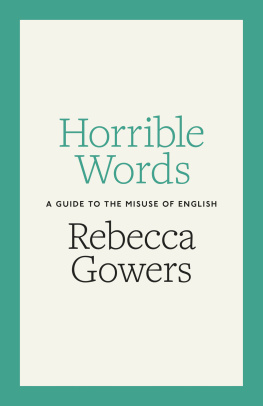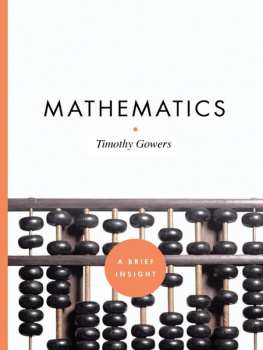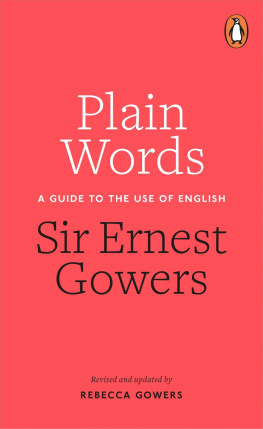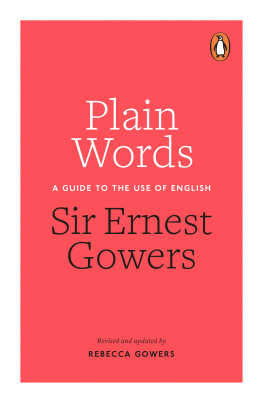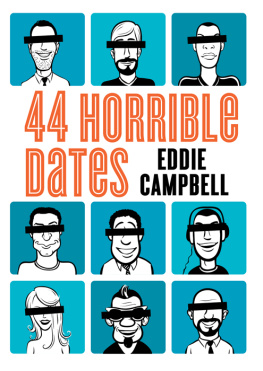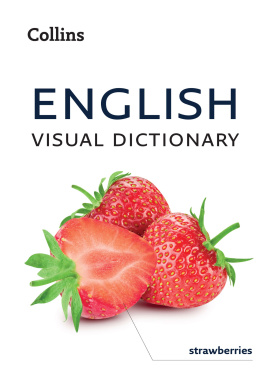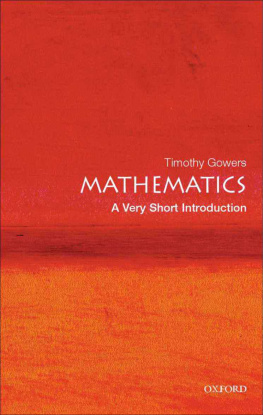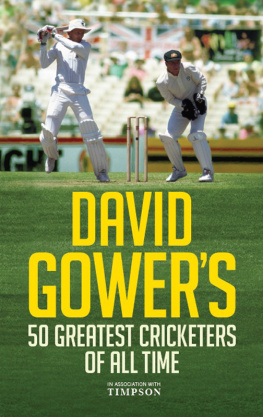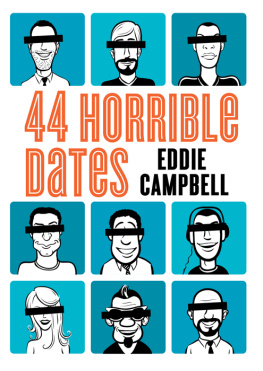Contents
Rebecca Gowers
HORRIBLE WORDS
A Guide to the Misuse of English
PARTICULAR BOOKS
UK | USA | Canada | Ireland | Australia
India | New Zealand | South Africa
Particular Books is part of the Penguin Random House group of companies whose addresses can be found at global.penguinrandomhouse.com.
First published 2016
Copyright Rebecca Gowers, 2016
The moral right of the author has been asserted
Cover design Matthew Young
Excerpt from This be the Verse from The Complete Poems of Philip Larkin by Philip Larkin, edited by Archie Burnett. Copyright 2012 by The Estate of Philip Larkin. Reprinted by permission of Farrar, Straus and Giroux, LLC and Faber and Faber, Ltd.
ISBN: 978-1-846-14852-1
THE BEGINNING
Let the conversation begin...
Follow the Penguin Twitter.com@penguinUKbooks
Keep up-to-date with all our stories YouTube.com/penguinbooks
Pin Penguin Books to your Pinterest
Like Penguin Books on Facebook.com/penguinbooks
Listen to Penguin at SoundCloud.com/penguin-books
Find out more about the author and
discover more stories like this at Penguin.co.uk
PART I
But when we look round on the vast multitude of writers who, to all seeming, deliberately aim at failure, who take every precaution in favour of failure that untutored inexperience can suggest, it becomes plain that education in ill-success, is really a popular want. In the following remarks some broad general principles, making disaster almost inevitable, will first be offered, and then special methods of failing in all special departments of letters will be ungrudgingly communicated.
ANDREW LANG , How to Fail in Literature, 1890
On Horrible Words
monsters and barbarities
Under the letter H, The Economist Style Guide has an entry on what it calls horrible words. With every appearance of judiciousness, it declares, Words that are horrible to one writer may not be horrible to another, but if you are a writer for whom no words are horrible, you would do well to take up some other activity. Similar volumes on style go even further in anathematising certain words as non-words.
The term non-word was first dreamt up by philosophical Victorians hoping to hint at something mysterious: By the word alone is the non-word revealed; By giving Scripture a wrong sense men make Gods Word become their own non-word, etc. However, non-word has long since jumped the bounds of lofty discourse and is now a word for a word that is not a wordrather as rebellious citizens under merciless political regimes are sometimes labelled non-persons. Of course, a non-word is harder than a non-person to restrain, let alone to murder. But there are those who try; and their influence can be traced in all the hedging found below:
People feel jargon word empowered, they feel in charge of their destinies (Guardian)
Thousands of men are receiving testosterone treatments funded by the HSE to combat the so-called manopause. (Sunday Times)
We live a life of many dinners, many haircuts, many nappy changes. You cant narrate them all. You pick and choose. You (in the unlovely vernacular of our time) curate. (Guardian)
The story has, as the marketeers would put it, done a great job of enhancing the universitys brand. (Telegraph)
when any major figure from the art or entertainment world goes, so to speak, off-piste. (Independent)
Whose heart-cockles were not thoroughly warmed this week by the sweet letter that a head teacher wrote to her pupils and that went, as they say, viral? (The Times)
its all a bit inspirationalquote-unquote. (Guardian)
The actress has even gone so far as to delete all those old tweetsrestarting her narrative, as it were. (Washington Post)
a series of advertisements featuring, for want of a better word, real people. (Guardian)
Read enough sentences of this kind, and it can start to seem a bit shabby the way their authors disavow the very words that, to all appearances, best suit their purpose.
Still, it is nothing new to express qualms about the odd barbarous vocable, as Coleridge put it, or paper-sore, A. P. Herberts dismissive term. Swift, in a letter of 1712 entitled AProposal for Correcting, Improving and Ascertaining the English Tongue, wrote Mostly, White noted, his words-no-words were usurpers, interlopers, or vulgar pretenders; but some he classed as deformed creatures; while others, though legitimate enough in their pretensions, he considered oppressive, intolerable, useless.
White was free to feel oppressednaturallyif that was how it took him. But for him to say that the words that happened to oppress him were useless was not wholly logical (logic being, he believed, immensely important). The monsters must have had their uses. Why else did he bother about them?
This question suggests itself now not least because people continue to be bothered by what they think of as lexical vulgarities, grotesqueries and abominations: the abuse is as immoderate today as it ever was. But is blanket contempt of this kind really good enough? Perhaps it is time to give our horrible words a little more thought.
1
Slipslops
poultry interest rates
On 8 January 1788,
The label slipslop was being applied to this type of gaffe in homage to Mrs Slipslop, a character from Henry Fieldings novel of 1742, Joseph Andrews. Mrs Slipslop mistakes fragrant for flagrant, virulent for violent, and speaks slightingly of the type of nasty woman who is a Scandal to our Sect. Byron liked this joke so much that he repeated it in a letter of 1813, referring to what Mrs. Slipslop terms the frail sect . And in 1800, Matthew Monk Lewisa writer of ghost stories, himself haunted by charges of plagiarismwould shamelessly drop a revenant Mrs Slipslop into a play of his own. Lewiss character is dreadfully prone to just the sort of error that marked her precursor, as when she says, it threw me into such a constellation, that I thought I should have conspired. Yet, as Burneys remark shows, the slipslop also came to stand as a concept in its own right. In an 1810 edition of The European Magazine, and London Review, there is a diatribe against parents who merely laugh when their children misconceive and misuse words. Instead, the author declares in furious italics, any childish slipslop must be subject to

